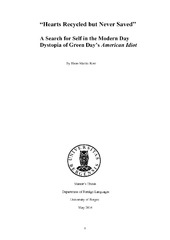"Hearts recycled but never saved" - A Search for self in the modern day dystopia of green day's American Idiot
Master thesis
Permanent lenke
https://hdl.handle.net/1956/12706Utgivelsesdato
2016-05-15Metadata
Vis full innførselSamlinger
Sammendrag
Despite ten years of gradually decreasing commercial success, the American rock band Green Day soared back to stardom with their 2004 concept album American Idiot. By academics and laymen alike, the album has been looked at as an anti-Bush manifesto. This thesis argues that such a marginalization is both unfortunate and inaccurate. This thesis therefore explores what it is that has provided American Idiot with such longevity (it has, for instance, been adapted into a Tony award winning musical) and argues that the characters in the story represents eternal and far greater questions than just how the apathy of a few selected individuals manifested itself during the George W. Bush era. This thesis tries to understand what American Idiot conveys about modern society and the elite's control of the masses, as well as mass media's role as shaper of public opinion. By following the central character through every step of his journey we see how his thoughts and actions goes into discussion with a multitude of philosophers, most notably Søren Kierkegaard. The album explores whether or not Kierkegaard was right when he claimed that or age is the age of reflection, and that modern man is no longer willing to suffer for what he believes in. The protagonist's return to an existential square one at the album's end brings forth the discussion whether or not it is possible for the individual of the modern age to live an authentic, free life. Unlike other works on American Idiot, this thesis examines not only the lyrics, but also the music and the album artwork. By treating these three aesthetic components as vital pieces of a complex totality, this thesis brings out the overlooked elements of an album regrettably mistreated.
